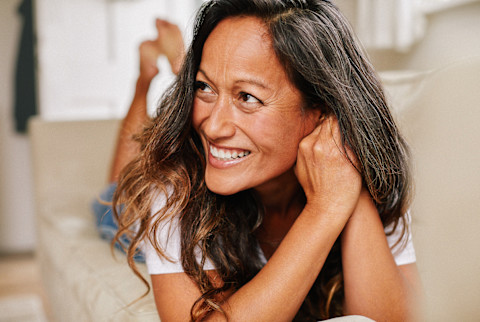Acne Doesn't Stop At Menopause—How To Treat It From A Holistic Derm

For anyone going through it, this should come as no surprise: Menopause brings many changes to the body. The sudden changes in hormone levels can affect everything from sleep to temperature regulation, mood, and skin.
When people think about how menopause changes your skin, they usually think about two major aspects: collagen loss and increased dryness. These, of course, are issues that affect quite a number of people during this time. Notably, your collagen levels can decline in fairly increased percentages: Skin can lose 30% of its collagen during the first five years of menopause and about 2% of its collagen every year after for the next 20 years.
Dryness, too, becomes an increased issue as the skin barrier function becomes weaker, and therefore, women experience significantly more transepidermal water loss, leading to flakier, more dehydrated skin.
But there's one skin change you may not be expecting: acne. Yes, menopausal acne is certainly a thing.
Why some experience acne during menopause
Acne, it seems, spares no age group. You can develop it as a preteen while experiencing puberty, develop it later in life with hormonal changes in your 20s or 30s (the bemoaned adult acne), and yes, you can get blemishes during menopause. And the thing is acne is a complex skin condition that has many contributing factors—some internal (like genetics or diet), some external (improper skin care routines), some environmental (the weather), and some lifestyle (you regularly work out in makeup).
So, if you think about it, of course it can affect you at any stage of life, as there may be a number of reasons you are breaking out at the moment (this is especially true if you are genetically predisposed to it).
In menopause, acne seems to be the result of significant hormonal changes that alter the skin.
"As our hormones diminish in menopause, the functions they perform to maintain the health and vitality of the skin diminish as well, characterized by a change in sweat, sebum, and the immune functions resulting in significant alterations in the skin surface including pH, lipid composition, and sebum secretion," board-certified dermatologist Keira Barr, M.D., previously told us about menopause and skin. "These changes also provide potential alterations in the skin that may affect the skin microbiome."
But unlike teenage acne, which is usually triggered by a massive uptick of sebum production, menopausal acne is typically the result of a hormonal imbalance (when your estrogen1 drops, your skin is thrown into a state of confusion as it regulates much of your skin's behavior2), shifting microflora, and inflamed skin. Thus, it takes a much different approach to treat it.
How to tend to menopausal acne
OK, first up: Nix some of your previously held notions of how to treat pimples. They're not going to help you here.
"If you're breaking out, you may not be able to tolerate the treatments you used as a teenager because the skin is thinner and drier and the treatments may be too harsh," says Barr. "Avoid acne products that can dry your skin, as that can make acne worse. Taking a look at your diet as well as dairy products and sugar can stimulate the production of sebum."
Instead, here are a few easy-to-follow guidelines:
- Strengthen your skin barrier function. Your skin barrier function is of the utmost importance for your overall skin health and affects everything from hydration control to even inflammation. For healthy skin, you must have a strong skin barrier. Unfortunately, changes in the skin structure during menopause can compromise the epidermis, leading to easily irritated, dry skin. And for some, this can trigger breakouts.
- Address inflammation. While we are on the subject of inflammation, make sure you are addressing all the possible causes as this will play a huge role in regulating acne during menopause. You can address this externally with a soothing, calming topical like oat and aloe vera, but you should also tend to your diet (try eating meals with anti-inflammatory foods), reducing stress, and getting enough sleep.
- Exfoliate with gentle acids, buffered with additional hydrating ingredients. So exfoliators are totally off the table, but you should certainly look for options that are easier on the skin. The potent peel pads of your youth may be far too strong for your skin now and may only cause further issues. Lactic acid is a derm favorite as it is gentle enough for sensitive-skin folk, or you can try stronger exfoliators—retinol, salicylic, or glycolic, for example—just be sure they are formulated with hydrating ingredients as well.
The takeaway
Acne can affect you at any stage of your life, as it's a very complex condition that can have many triggers (especially if you are genetically predisposed to it). However, this particular iteration of acne should be treated differently than perhaps you have in the past.
Instead of going after it with vigor, layering on acids and taming oil production, menopausal acne should be tended to gently, focusing on inflammation, skin barrier function, and the occasional (gentle) exfoliation.
